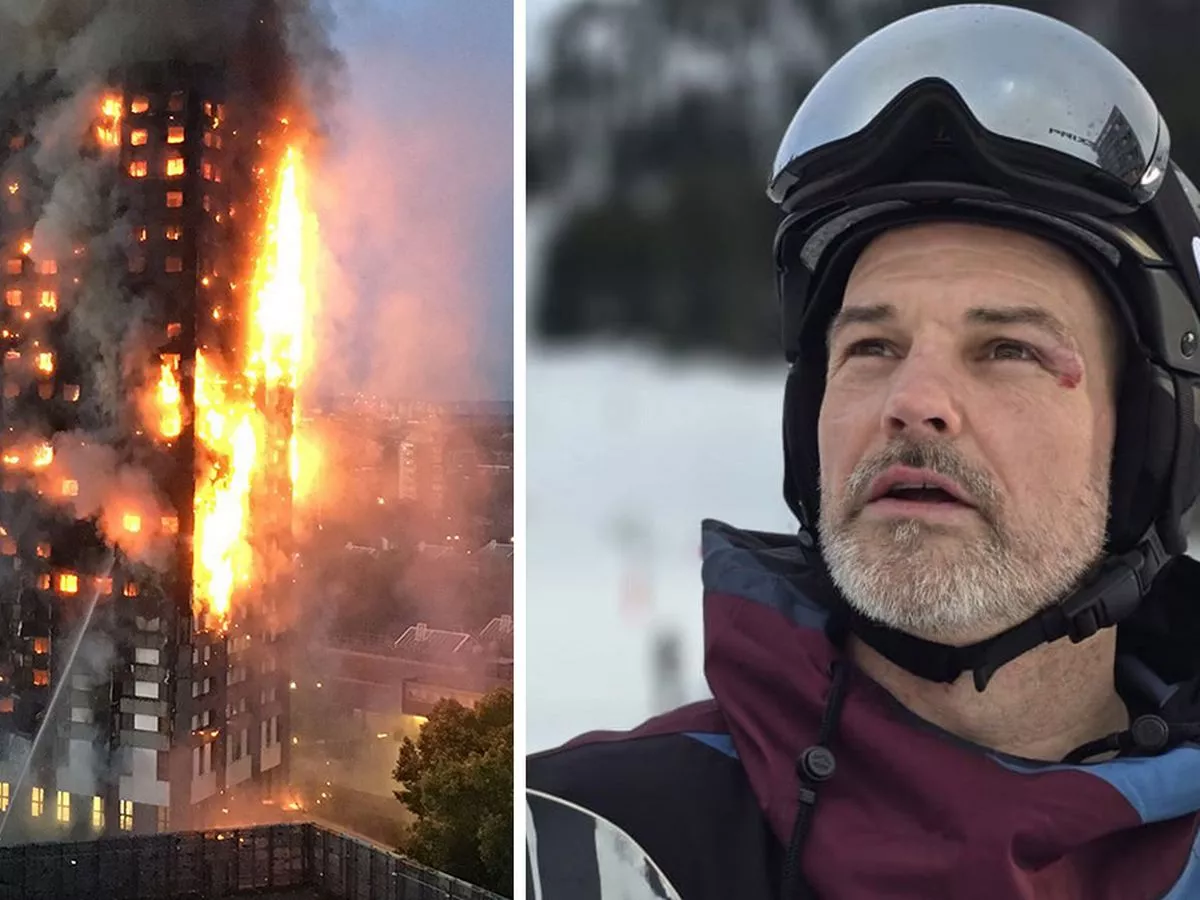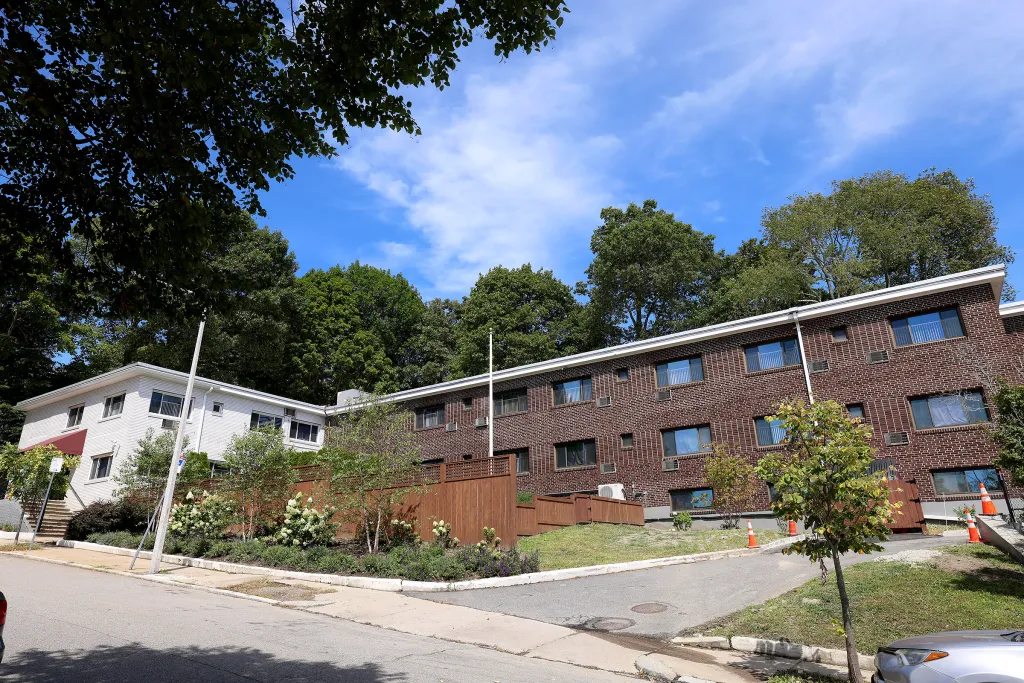Copyright mirror

On the evening of June 14, 2017, Ricky Nuttall and his fellow West London firefighters found nothing out of the ordinary to spark alarm on their shift. Little did they know, as they carried out their equipment checks and enjoyed a cup of tea, that they were about to enter into a living nightmare. The team went to bed at around midnight. Not long afterwards, in the early hours, they were awoken and alerted to an incident. As a firefighter, Ricky was well used to having to get ready quickly, going from " being asleep in your pants to being fully rigged and driving a fire engine" in the space of around 60 seconds. By the time he got to the watch room, Ricky realised it would be a tough job ahead of them. The slip was still printing due to the amount of resources required to extinguish the massive blaze that awaited them. Ricky told The Mirror: "W e knew from that point it was a big job. It was actually a working fire. And it was going to be a long night." With no time left to lose, the firefighters swooped across North Kensington to a 24-storey '60s era tower block, built to house around 600 people. The name of the looming Brutalist building was Grenfell Tower. Looking back on his earliest impressions of the now infamous scene, Ricky, 44, recalled: " It was obvious from the outset, from arrival, that the building wasn't reacting as it should do to the fire. It was a very dynamic incident in every sense. So, it was a chaotic scene at the start, but it was what I always refer to as organised chaos. Everyone had their job. Everyone knew what they were doing, but everyone was running somewhere." In the chaos that ensued, Ricky witnessed people being pulled from the burning building, bits of which were falling down all around. At one point, one of the fire engines was very nearly caught alight after a smouldering piece of debris landed on it. He remembers he and his colleague being "in a sort of queue to go into the tower", getting their first briefing. The harrowing scenes that unfolded from that point onwards made it clear that this was no ordinary fire. Ricky shared: "T o get a sense of the situation, when we first arrived and we're standing in the lobby area, one of the first things I saw were three firefighters carrying out two girls who looked around between sort of 11 and 14, I would guess. "And they were on their backs, limp, unconscious, not breathing, with black soot coming out the corners of their mouths and black soot coming out their nostrils. Not alive. And as the first two firefighters carried the girls past us, the third firefighter made eye contact with me randomly, and he just stopped and said to me: "Be careful in there." He continued: "And a firefighter's never said that to me at a job before, and never has since, you know, up to the day I left. And it really sort of rammed home, 'right, I'm going to see some stuff in here that I've not seen before', e ven in the 15 years I've already been in the fire brigade at this point. "I'm going to experience stuff I've not experienced, and I'm going to have to really be on my toes to make sure that I manage to come out of this and hopefully manage to save some people as well. Thankfully, those two girls were resuscitated outside, and they survived the night, unlike, unfortunately, 72 other people." In the years since, the charred, looming wreckage of Grenfell continues to prompt a shudder, but images alone do nothing to convey what it was really like to walk into the building as it boiled and crumbled. Painting a picture of his own experiences in the scorching depths of Grenfell, Ricky remembered: " The building was failing around firefighters. For me, at one point on the 15th floor I was running out of air and it was 550C. You could feel your skin burning inside your fire gear. You're running out of air. You haven't got water at this point. The fire is burning above you, below you, and from both sides. And I think most firefighters that night at one point or another had a belief that they wouldn't be coming away from this job alive." For Ricky, there were too many acts of heroism to count that day, both from firefighters and residents, who took enormous risks in their desperation to save unreachable loved ones. Going "above and beyond all of the health and safety protocols", courageous members of the London Fire Brigade removed demand valves from masks, "breathing in toxic hot fire gases" before putting the valve back in when it became unimaginably hard to breathe. This was so, as explained by Ricky, "they could preserve a tiny bit more air", allowing them to "go a little bit further into what was already a horrendously dangerous fire". Having worked through sunrise and well beyond, the firefighters were finally able to finish their shifts at around 2pm, and already it was clear that those who witnessed the events of that day would need to have serious psychological support in place. Then, Fire Chief Dany Cotton, described by Ricky as a "wonderful human being", set up an emergency debrief/counselling area at Paddington Fire Station . Before going home, firefighters were asked to testify as to what they'd seen in a few brief sentences. This measure proved to be crucially important. As explained by Ricky: "W hen your brain goes through extreme trauma, it has a weird way of filing things away, and it will leave gaps in stories and create bridges that aren't there. And so it's very difficult. Maybe a month after the fire, if you've not spoken about it or thought about it, then you won't necessarily be able to recall everything that happened in the right order and you'll be thinking, 'Well hang on, if that if I was there, then how did I get outside at that point then?', and there'll be gaps. Having survived "the most fatal fire that London has experienced since the Blitz", Ricky found responding to the initial counselling offered to be a perplexing process, however well-intended the service was meant to be. He reflected: " I was greeted by a very lovely lady by all accounts, but nonetheless, a lady sat there saying, 'How are you feeling?' And I remember laughing and going, 'I don't know yet. I haven't got the first clue yet how I'm feeling'." Although Ricky knew he had the fire station counselling service to turn to, he had no idea then the extent to which his mental health would decline, not as " a cliff dive", but as "a very swift but gradual decline into PTSD and depression". Ricky revealed: "Having never experienced poor mental health before, I was unable to recognise any signs because I didn't know what they looked like. I wasn't educated in mental health enough to know that my actions and my behaviours that were changing were changing because of me and not because of what's happening to me from other people. And by that, what I mean is when I got really, really, really angry over really, really, really tiny things, I thought it was because those tiny things were big things. "I didn't think it was because my reaction was disproportionate to what had happened. And so there was no easy way for me to see, really, before it was too late, that I was really struggling with my mental health." Unfortunately, Ricky's mental health struggles took a severe toll on his personal life, driving away friends. Just three months after a friend's firm warning that he would lose everything if he didn't seek help, Ricky's marriage broke down. He shared: "I'd lost my partner, and I'd lost my son. The only thing I'd managed to keep hold of was my job." At work, at least, Ricky was surrounded by people who understood what he was going through, with the fire station becoming a place of "solitude". However, the pain he was dealing with was still very much there, no matter how much Ricky threw himself into work, and so, one "dull" and "dreary" autumn day, the firefighter knew he was in "big trouble". By this point, Ricky was "drinking heavily" but not, as he recalls, on this particular day. He'd gotten up from the sofa to fetch a glass of water and ended up "slumping to the floor" in tears. It wasn't unusual for Ricky to cry during this period, but this time around felt "different". Ricky explained: "I realised in that moment that this time I didn't feel like I was going to stop crying. And it wasn't like a gentle, you know, tear rolling down the cheek. It was sorrowful and full of pain. And it was the crying you do at a funeral. And I was just uncontrollable. I was just crying and crying and crying. I sat on that floor for hours, and I could not stop crying. "I remember in that moment I thought, 'this is how I'm going to feel for the rest of my life. This isn't going to change'. And then I thought, 'Well, if that's true, why would I want to live the rest of my life?' And that was the first moment that I started thinking about whether or not I should take my own life." This harrowing thought was enough to shock Ricky into action. He called his parents, one after the other, with both advising him to phone his GP. He did so and, "by some miracle," a last-minute cancellation meant he could be seen in 15 minutes. Very quickly, the doctor suspected Ricky was suffering from post-traumatic stress disorder (PTSD) and urged him to start taking antidepressants as a first step. Ricky, who'd long been "anti anti-antidepressants", was surprised by how effective the medication was when paired with counselling, which he admits he'd previously not made the best use of - spending sessions focusing on the wrong things, including his broken relationship with his ex-partner, who he now regards as a "fantastic friend". As Ricky explained: " Now, the only way I can really fully explain this is with an analogy I use when I deliver talks to people, which is PTSD felt to me like a dark room with no doors, no windows, and no light. No way out, no hope. Having counselling was like someone cut a skylight into the ceiling. So, now some light's getting in, and I've got a little bit of hope because I can see a way out, but it's in the ceiling. "I can't reach the skylight. So, it's actually a bit frustrating. I can see that there's a way out, but I can't quite get there. Going on the anti-depressants as well as the counselling meant the skylight stayed open, but the anti-depressants were like someone lowered in a footstep. Now I can reach the skylight." Now employed by Govia Thameslink Railway (GTR), Ricky is in a new relationship and has a much deeper understanding of himself and all he's been through. He now has the tools to deal with his trauma effectively, with patience and self-compassion. Finding his happiness again wasn't, in Ricky's words, "a steady staircase". There've been plenty of ups and downs along the way, but he's managed to rebuild his life and has used his experiences of trauma to help others. Now a leading mental health advocate and published poet, Ricky is supporting a new GTR partnership with Mind, which highlights how acts of kindness can have a significant impact on a person's mental wellbeing. New research from the train company found that four in five people (83 per cent) reckon a compliment or small act of kindness can boost their mood, with nearly half (49 per cent) believing this boost lasts all day long. With this in mind, right throughout October, four train seats will be positioned at London Blackfriars station before a specifically designed installation, which directs travellers to Mind’s resources, while encouraging them to "sit, pause and connect". Ricky, who has written a poem to mark the campaign, reflected: "You know, everyone's got earphones in, everyone's disconnected, everyone's dialled into screens listening to music, no one wants to talk. And if you imagine being someone on that train on the way to work that morning, having an awful, awful time, you might just be desperate for someone to go, 'You okay?' You might be desperate for someone just to give you a smile, or make any kind of gesture at all." If you're struggling and need to talk, the Samaritans operate a free helpline open 24/7 on 116 123. Alternatively, you can email jo@samaritans.org or visit their site to find your local branch Do you have a story to share? Email me at julia.banim@reachplc.com



